The unicorn may be a mythical animal, but its impact on the food scene is all too real. This is what happens when it meets the popular noodle. Anju Maskeri and Kusumita Das decode the magic
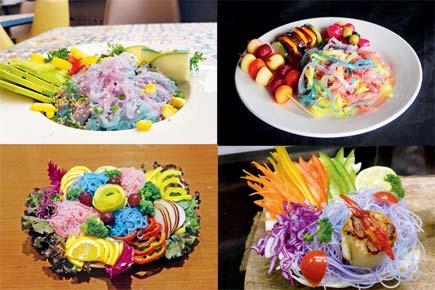
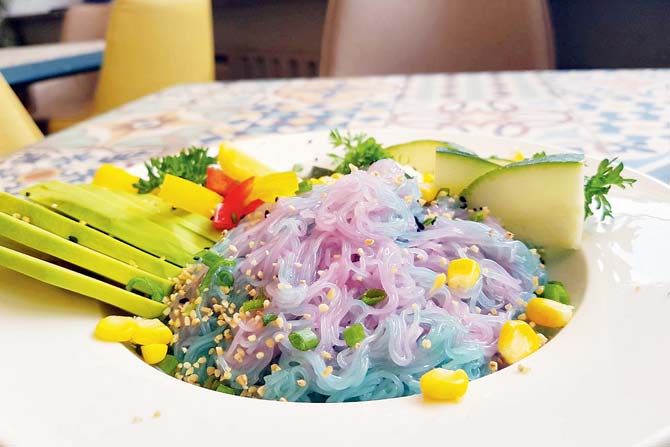
ADVERTISEMENT
Unicorn pasta noodle salad bowl
Amanzi, Bandra (West)
Rs 280
The greatest lure is the gimmicky aspect of the noodles, feels executive chef Akshay Kale. Kale is in the process of developing the dish that will be introduced to the menu this week. "This one changes colour, literally. We take glass noodles or pasta noodles, soak them in water, add purple cabbage juice, before we strain them. Store it in the fridge, as it's a cold dish. Once you take it out and add lemon juice to it, it changes colour, due to changing pH levels. It can turn blue, red or even purple, depending on the citric acid levels. We need to ensure that everything else that goes into the dish is ready, as the colour change doesn't hold for more than 20 minutes," says the chef.
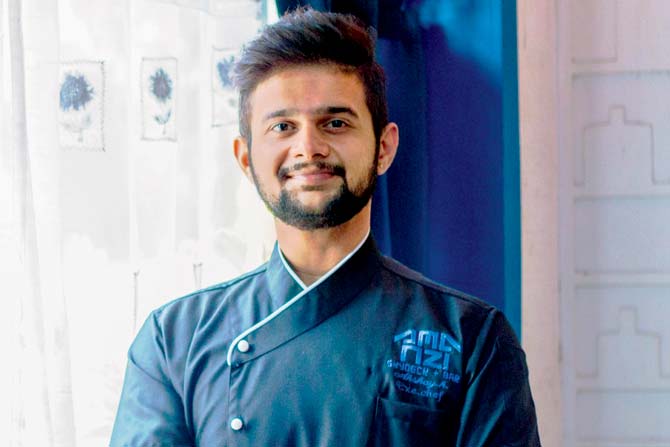
Other elements like cherry tomatoes,malta orange, chia seeds and herbs are kept ready. "What makes this dish intriguing is that the colours continue to change on the plate, as the guest enjoys it.Indian diners love a good gimmick and this trend is still new," he adds.
Unicorn stir-fried butter garlic noodles
All Hoppipola outlets
Rs 180-Rs 240
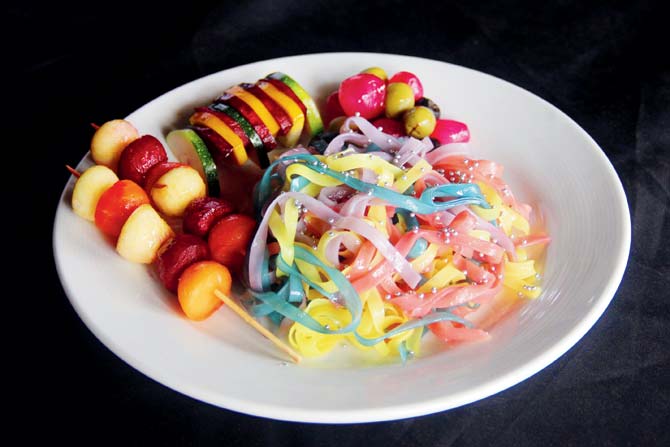
A plate of unicorn noodles might dazzle you with its colours, but chef Harman Sawhney of Hoppipola tells us that they are surprisingly easy to prepare. The trick is to use natural colours, he says. "Depending on your choice of colour, you take an ingredient and boil it in water. For instance, for red noodles, take cut beetroot, boil it in water, take it out and then add the noodles to it. The noodles will take on a nice, concentrated hue of scarlet. And, this is different from Schezwan noodles, because that takes on the colour of the sauce." He prefers using no sauce, because he'd rather not dilute the colour and flavour that natural ingredients lend to the noodles. "You can even make blue noodles. Boil red cabbage in water and add a pinch of baking powder to it." He opts for mild flavours of olive oil, basil and butter garlic, as "anything else will be too overpowering".
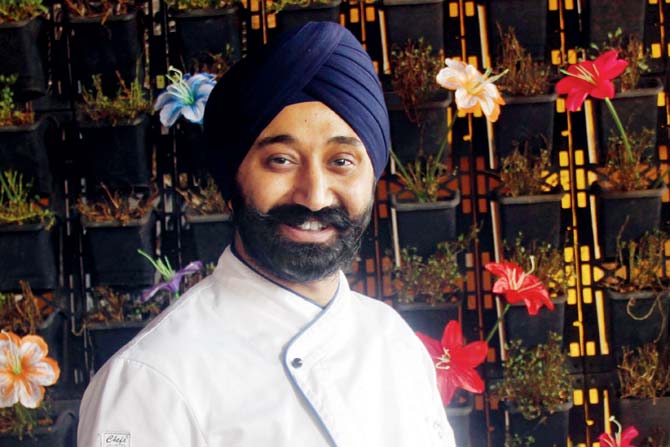
It was six months ago that he first tasted the dish at a birthday party in Pune. "This dish has more visual appeal and children are especially drawn towards it," says the 35-year-old chef, who introduced it in his kitchen two months ago.
Initially, however, customers had their reservations. "The most common perception is that they are laden with artificial colour. There have been times when I've had to take guests into the kitchen to show them how we make the dish," Sawhney laughs.
Unicorn Noodle Bowl
Sea Princess Hotel, Juhu
Rs 599
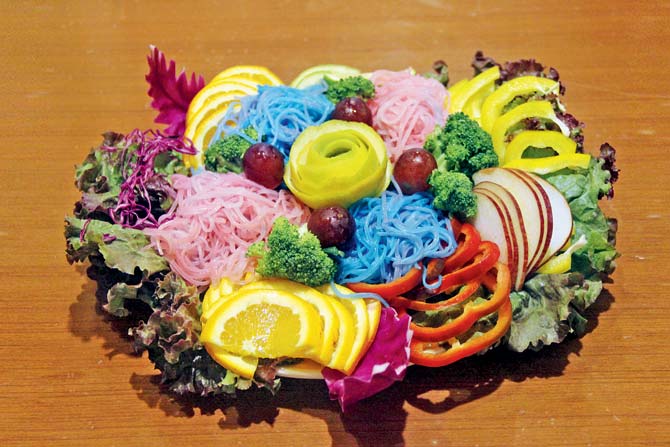
At Jeon, it's the kids who favour the dish. Jerson Fernandes, executive chef, attributes this to its colour-changing quality. "This is why we call it magic noodles. It goes from blue to pink when in contact with anything acidic or alkaline," he says. Here, the unicorn noodle bowl is accompanied with an assortment of farm fresh veggies like enoki mushrooms, artichokes, asparagus and red radish marinated in spices. "It's a simple process and all you need is clear white noodles (preferably glass noodles/ spaghetti), purple cabbage for the hue, water and a squeeze of lemon juice," he says.
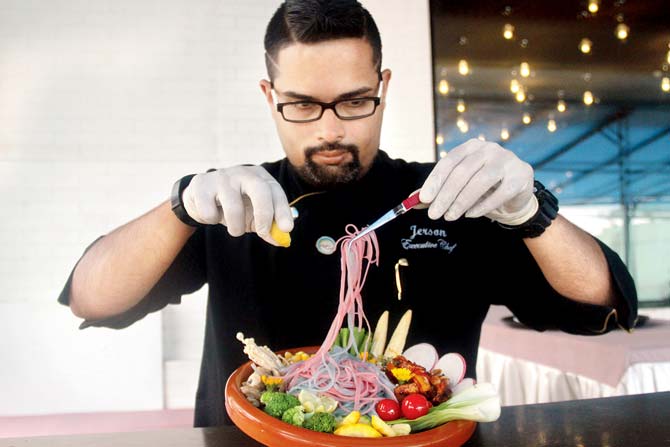
Chef Jerson Fernandes prepares magic noodles. Pics/ Tanvi Phondekar
The colour of the noodles depends on the amount of water used for boiling the cabbage and the time the noodles is allowed to sit in the water. "The hotter the water, the more colour the cabbage releases," he says. It was in May this year that the chef was introduced to the concept. "That it is natural and healthy inspired me to launch it on my menu." Because the colour purple doesn't impart any flavour to the noodle, Fernandes prefers to serve it with a mix of stir fried baby corn, mushroom, sprouts and an Asian infused stir-fried protein like a cottage cheese or tofu. In fact, it's become so popular that he has introduced other versions like unicorn sushi, unicorn pasta, unicorn shakes and unicorn rice pudding to the menu.
Unicorn Noddles with Smeared Scallops
KAAMA, Lower Parel
Rs 550
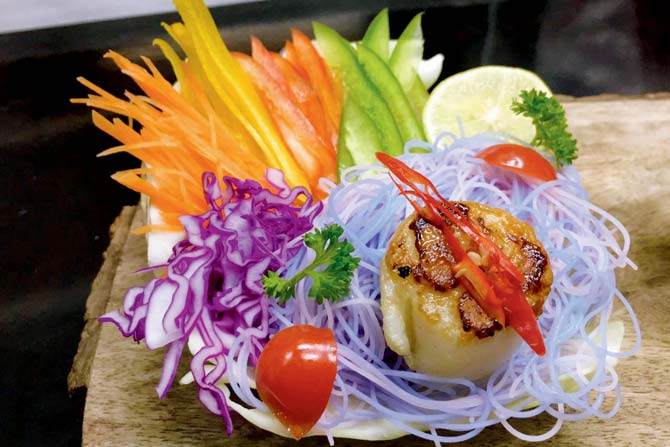
Executive chef Rohit Lobo first tasted unicorn noodles during a trip to Taiwan last year. "The rainbow colours left me mesmerised. I believe that you eat with your eyes before you actually taste the food," he says. When he decided to replicate the recipe, Lobo realised the challenge it came with. "Well, I'm no Jamie Oliver, so it took me three attempts to get the colour I was looking for. You need to master the ratio of water to purple cabbage and then the amount of lime needed to change the colour of the noodles to get the pink. It is a game of patience and a few trials," he says. Till date, he has experimented with the noodles along with carrot, zucchini, bell pepper, avocado, radish, beetroot and cabbage.
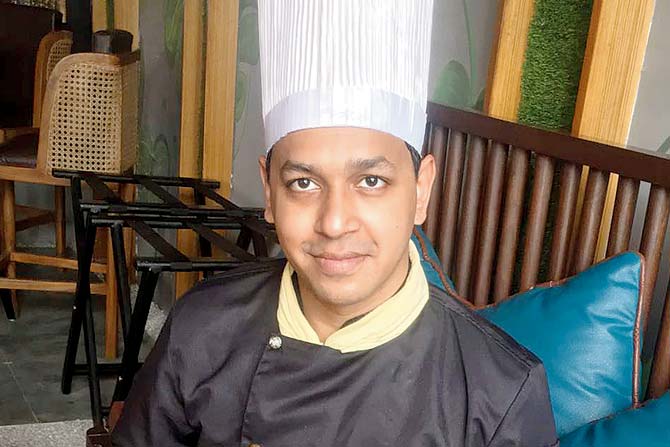
The noodles, which have a hint of lemon, complement the sweetness of the fresh vegetables, making it a good balance of flavours. "I have made a few people try it and the first reaction was "it's too pretty to eat". The next thing they did was take a
hundred pictures for Instagram and Snapchat," he laughs.
Unicorn Bowl with vegetables
Dishkiyaoon, BKC
R350

Chef Sunny Punjabi, Sous Chef at Dishkiyaoon, gets why the food world is tripping on the unicorn and mermaid trends. "What makes it interesting is that experimenting with your regular kitchen ingredients can give 'unicorn' colours to a dish. And the best part is that it's healthy," he says. Punjabi was in New York, when he sampled the unicorn bowl from a food truck. At the BKC restaurant, he uses saffron, purple cabbage and zucchini to lend colour to the noodles.
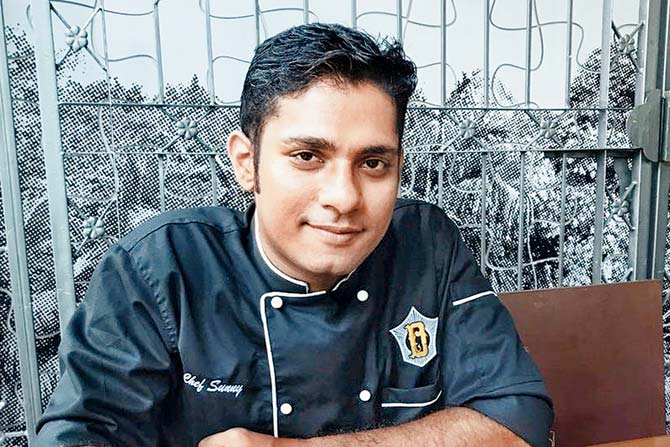
While many have appreciated the dish, the chef feels it may not appeal to everybody. "Those who didn't have a taste for citric flavours didn't like it much. We also received feedback to pad it up with more protein and greens, which we've done."
Unicorn Noodles Salad
29, Kemps Corner
R200
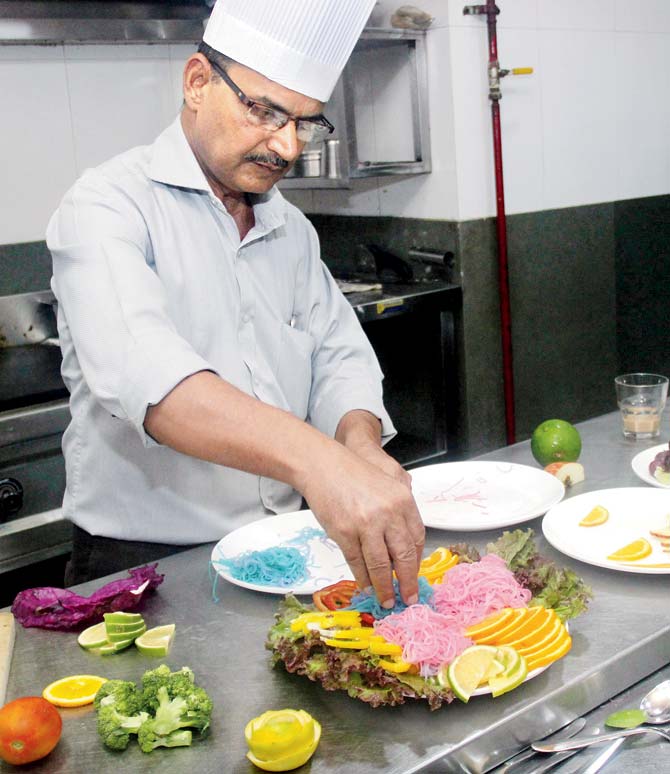
Executive sous chef Sunderlal Shah tasted unicorn noodles for the first time only a month ago, deciding almost immediately to whip them up himself. What sets it apart from regular noodles is that these need to be soaked and not boiled. The dish is the latest addition to the restaurant menu. "You can prepare the dish with any variety of noodles. We take water and put the red and purple cabbage in it to extract the colours. We soak it for half an hour to get a dark hue, and after that we squeeze lemon and orange juice on the clear noodles. The process takes 15 minutes. Then, we plate it with fruits, cucumber and beetroot. We glaze it with a drizzle of honey chilli sauce to add to the flavour. The taste depends entirely on the dressing. Our version tastes a little fruity and citric." Shah feels unicorn noodles taste best with fruits. "The zesty and citric flavours of the fruits combined with the earthy taste of beetroot and purple cabbage make for a balanced and nutritious dish," he says. The foremost challenge is getting guests to try unicorn noodles. Shah says, "We have done a few tastings and initially, we had to convince guests about its authenticity. But, I feel unicorn noodles are here for the long haul. Who wouldn’t want noodles that are both healthy and visually appealing? Plus, think of that picture-perfect image on your Instagram!"
You may also like - Good morning Mumbai: 11 best places for breakfast in the city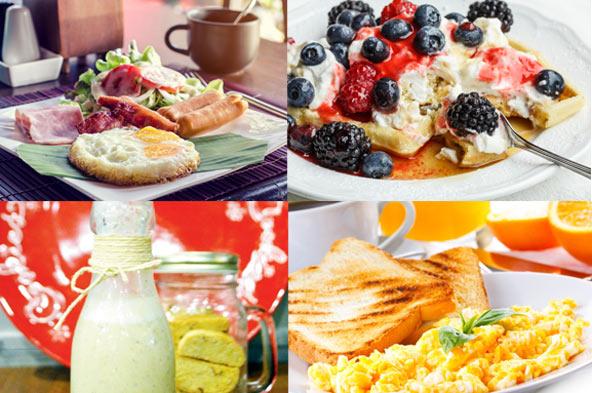
 Subscribe today by clicking the link and stay updated with the latest news!" Click here!
Subscribe today by clicking the link and stay updated with the latest news!" Click here!






